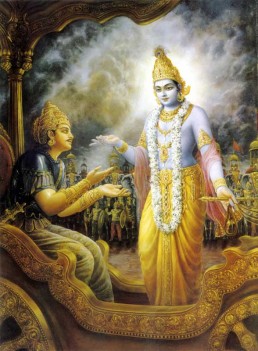Commentary
Sins of the past are the cause for the present pains and the present sins are the cause for future sorrows. All the causes for the sorrows in social life can be removed if the members of the community find happiness in enjoying the results of their efforts performed in true Yajna spirit. As a contrast to this it is pointed out that those who cook for themselves only meaning those who perform actions only with selfish motives are eating nothing but sin. By doing the work in yajna spirit, the selfish life is transformed into an unselfish one and the individual becomes aware of the interdependence of all beings.
ACTION SETS THE WHEELS OF THE COSMOS GOING
Swami Chinmayananda
Swami Chinmayananda Commentary
The commentary on this verse and the rest, is avaialble for free as:
Kindle eBook
Google Play Book
Apple Books
Adi Sankara Commentary
Those again, who are yajna-sista-asinah, partakers of the remnants of sacrifices, who, after making offering to the gods and others, [The panca-maha-yajnas, five great offerings, which have to be made by every householder are offerings to gods, manes, humans, creatures and rsis (sages).] are habituated to eat the remnants (of those offerings), called nectar; they, santah, by being (so); mucyante, become freed; sarva-kilbisaih, from all sins-from those sins incurred through the five things [the five things are; oven, water-pot, cutting instruments, grinding machines and broom. A householder incurs sin by killing insects etc. with these things, knowingly or unknowingly. It is atoned by making the aforesaid five offerings.], viz oven etc., and also from those others incurred owing to injury etc. caused inadvertently. Tu, but; the papah, unholy persons, who are selfish; ye, who; pacanti, cook; atma-karanat, for themselves; te, they, being themselves sinful; bhunjate, incur; agham, sin.
For the following reasons also actions should be undertaken by an eligible person. Action is definitely the cause of the movement of the wheel of the world. How? This is being answered:
The Bhagavad Gita with the commentary of Sri Sankaracharya – Translated by Alladi Mahadeva Sastry
Holy Geeta – Commentary by Swami Chinmayananda
The Bhagavad Gita by Eknath Easwaran – Best selling translation of the Bhagavad Gita
The Bhagavad Gita – Translation and Commentary by Swami Sivananda
Bhagavad Gita – Translation and Commentary by Bhaktivedanta Swami Prabupadha
Srimad Bhagavad Gita Chapter 3 – Verse 13 – 3.13 yajna-shishta – All Bhagavad Gita (Geeta) Verses in Sanskrit, English, Transliteration, Word Meaning, Translation, Audio, Shankara Bhashya, Adi Sankaracharya Commentary and Links to Videos by Swami Chinmayananda and others – 13-Mar

